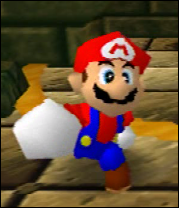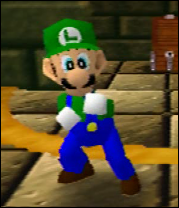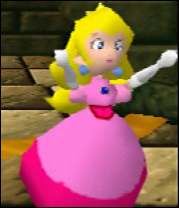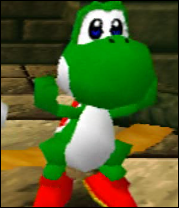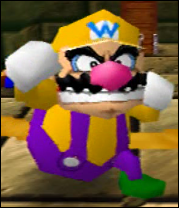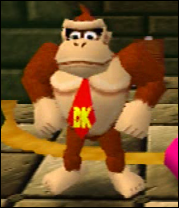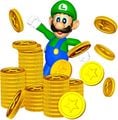Mario Party
Template:Articleabout Template:Infobox
Mario Party is a video game based on a board game, and the first of the expansive Mario Party series. Players choose one of six characters and move around the board. As they go around, they collect coins and various other items that can help them or hinder others in their quest to collect Stars. Twenty coins are required to buy a star.
What sets this game apart from others is the mini-games that follow each round. The players will be grouped together in groups of two, three against one, or everyone for themselves. They then compete in a game that tests their reflexes, puzzle solving skills, or plain luck. The winners will be awarded coins and the losers may lose coins.
However, being good at the game isn't enough to win. Luck is also important. It's possible to go from first to last in a single turn if another character is lucky.
Playable Characters and their colors
| Mario | Luigi | Princess Peach | |||
|---|---|---|---|---|---|
| Color | Red | Color | Green | Color | Pink |
| Yoshi | Wario | Donkey Kong | |||
| Color | Light Green | Color | Purple | Color | Brown |
Boards
The original Mario Party had eight game boards, more than any other game to date (and not counting the Duel boards from Mario Party 3).
- DK's Jungle Adventure
- Peach's Birthday Cake
- Yoshi's Tropical Island
- Wario's Battle Canyon
- Luigi's Engine Room
- Mario's Rainbow Castle
- Bowser's Magma Mountain - Unlockable after all Boards are played, buy for 980 coins
- Eternal Star - Unlockable after 100 stars are gathered
Spaces
- Blue Space – Players will gain 3 Coins, but will gain 6 Coins for the Last 5 Turns.
- Red Space – Players will lose 3 Coins, but will lose 6 Coins for the Last 5 Turns.
- Happening Space – A variety of things will happen as the surprise is half the fun.
- Star Space – When the player passes here, he will talk to Toad about getting a Star if he has at least 20 Coins, but if he has less than 20 coins, he will not get a Star.
- Mini-Game Space – The player that lands here will play a 1-Player Mini-Game.
- Chance Time Space – The player that lands here will play Chance Time and hit three blocks and at the end, the chosen players step in and a player will take the other player's Coins or Stars or they will trade Coins or Stars.
- Mushroom Space – The Mushroom Block appears and if the Mushroom appears, he will take another turn, or if the Poison Mushroom appears, he will lose his next turn.
Mini-games
- Main article: Mario Party (mini-games)
Trivia
- Nintendo gave away a free Mario Party glove for a while after Mario Party's release. The reason being, albeit a silly one, was that many gamers got blisters and such on the palms of their hands. This was on the count of five of the mini-games involved spinning the analog stick around as fast as possible. Nintendo suggested that the gamers used their thumb, but this was way too slow, especially for the Fly Guy bonus game where it was a challenge to wind up the Fly Guy as much as possible so it would fly around the room as far as possible. The glove that Nintendo sent the gamers had no logo, nor did it have any Nintendo characters on it. Recieving the glove required proof of purchase of the first game of the series. It is interesting to note that the glove was not avaliable and the glove give-away did not surface until after the release of Mario Party 2. It is also very interesting to note that no future Mario Party game featured a mini-game involving spinning the analog stick.
- The Dice Block that Mario is hitting on the cover of the game shows a 3, leading many gamers to mistakenly believe that this game was Mario Party 3 after the third game was released.
- When a character becomes the Super Star, the title screen background becomes their own.
- Mario Kart Slot Cars, a promotion for Mario Kart DS, appear to be inspired by the Slot Car Derby mini-game.
- There are items called Event Blocks.
- In the end credits, part of the music is a harmony remix of the main theme song of the Mario Bros.
- Mario Party is often abbreviated MP.
Artwork
- Yoshiparty.jpg
Yoshi - Yoshifishing.gif
Yoshi playing Cast Aways - Wariodice.gif
Wario with a chance block - Dkchestparty.jpg
DK guarding his stash - Images toad3d.jpg
Toad looking up - Toadparty.gif
Toad ready to party - Mptoad.gif
Toad with legs showing - Koopaflag.gif
Koopa, your guide - Booparty.gif
Boo The cast at DK's Jungle Adventure The cast at Luigi's Engine Room The cast at Peach's Birthday Cake The cast at Yoshi's Tropical Island The cast at Wario's Battle Canyon The cast at Mario's Rainbow Castle - MarioPartyCast.jpg
The cast of Mario Party
| Nintendo 64 games | ||
|---|---|---|
| Super Mario franchise | Super Mario 64 (1996) • Mario Kart 64 (1996) • Mario no Photopi (1998) • Mario Party (1998) • Mario Golf (1999) • Mario Artist: Paint Studio* (1999) • Mario Party 2 (1999) • Mario Artist: Talent Studio* (2000) • Mario Artist: Communication Kit* (2000) • Mario Tennis (2000) • Paper Mario (2000) • Mario Artist: Polygon Studio* (2000) • Mario Party 3 (2000) • Dr. Mario 64 (2001) | |
| Donkey Kong franchise | Diddy Kong Racing (1997) • Donkey Kong 64 (1999) | |
| Yoshi franchise | Yoshi's Story (1997) | |
| Crossovers | Super Smash Bros. (1999) | |
